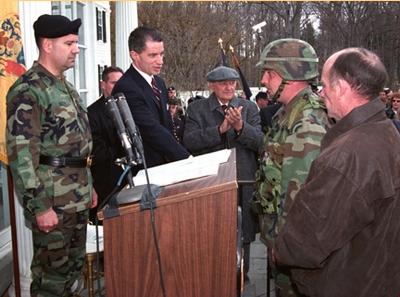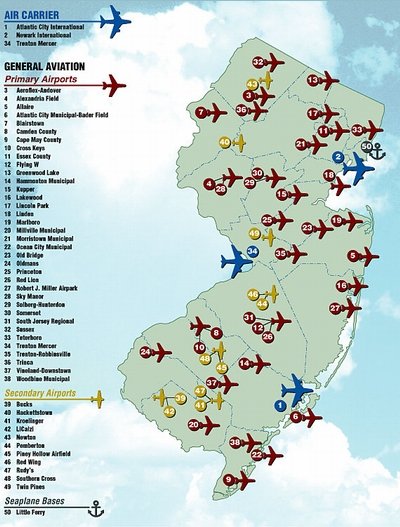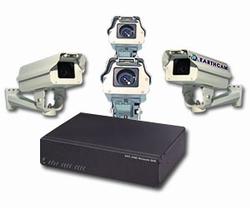Critics Worry McGreevey's Plan Will Choke GA
Worried that general aviation aircraft could be turned into
terror weapons, New Jersey Gov. James E. McGreevey (below) has
ordered a series of measures to strengthen security at New Jersey's
47 small general-aviation airports.

Airport managers said the improvements seem reasonable and
relatively easy to implement. But they also questioned how much the
upgrades would cost and who would pick up the bill. The Governor's
Office did not disclose a funding plan.
McGreevey spokesman Micah Rasmussen said the Sept. 11 terrorist
attacks tragically showed that airplanes can cause mass destruction
if they fall into the wrong hands.
"It's an important part of homeland security to protect our
airplanes and make sure our airplanes are not used as an instrument
of destruction," he said.
The McGreevey administration said small airports are more
vulnerable to terrorism than larger airports because they often
have only limited security and lack air traffic control towers to
monitor takeoffs and landings.

Beefing Up The Locks
Among McGreevey's new security improvements:
- GA aircraft parked on airport ramps or kept in storage for more
than 24 hours would have to use a two-lock system to prevent theft.
Locks would be placed on doors and another key part of the
aircraft, such as the wheels or propellers. There are currently no
federal or state regulations that require small planes to have
locks, the Governor's Office said.
- McGreevey also wants airport owners to install surveillance
cameras to monitor sensitive areas of their facilities.
- Airport managers will carry cell phones and pagers linked
directly to state and federal aviation authorities.
- Large signs will be installed to provide pilots and the public
with the telephone numbers of the airport owner, the police and
other authorities, such as the Federal Aviation Administration and
the New Jersey Division of Aeronautics.
Reasonable, But Perhaps Overblown?
 Praising McGreevey's plan as "pretty reasonable,"
the president of South Jersey Air said airports should have little
or no difficulty implementing the security improvements. However,
James J. Toland argued that small planes should not be considered a
serious tool for terrorists. He said they are too small for attacks
on large targets like skyscrapers or nuclear plants.
Praising McGreevey's plan as "pretty reasonable,"
the president of South Jersey Air said airports should have little
or no difficulty implementing the security improvements. However,
James J. Toland argued that small planes should not be considered a
serious tool for terrorists. He said they are too small for attacks
on large targets like skyscrapers or nuclear plants.
"It wasn't general aviation planes that were used for the
attacks on 9-11. It was a huge jetliner that rammed the World Trade
Center," he said.
"A little plane would literally bounce off a nuclear reactor.
You couldn't pack enough explosive on a general aviation plane that
would scratch the concrete on a reactor," he added.
Toland's South Jersey Air operates the city-owned Bader Field
airport in Atlantic City. His company also operated the Woodbine
Municipal Airport before the facility's management recently was
taken over by a government agency.
Toland said he already uses locks on the two planes owned by his
company. He fears that pilots will be forced to pay for new locks
to comply with McGreevey's directive.
Who Gets The Tab?
 William R. Colangelo, general manager of Ocean
City Municipal Airport, said he has already spoken to state
aviation officials about installing surveillance cameras. At this
point, it is not certain whether the state would pay for the
cameras, he said.
William R. Colangelo, general manager of Ocean
City Municipal Airport, said he has already spoken to state
aviation officials about installing surveillance cameras. At this
point, it is not certain whether the state would pay for the
cameras, he said.
Colangelo explained that Ocean City's airport is protected by a
secure gate and regular police patrols. He endorsed McGreevey's
security plan, noting that no community is completely immune to the
possibility of terrorism.
"I guess it could happen anywhere," he said.
McGreevey's security initiative stems from the recommendations
of a state task force headed by Transportation Commissioner Jack
Lettiere. Earlier in the week, Lettiere and the governor
implemented tighter security for the state's large commercial
airports, rail lines and highways.
"The Department of Transportation is working around the clock to
keep our citizens and transportation network safe," Lettiere said
in a statement.
 Aero-News: Quote of the Day (07.11.25)
Aero-News: Quote of the Day (07.11.25) ANN's Daily Aero-Term (07.11.25): Permanent Echo
ANN's Daily Aero-Term (07.11.25): Permanent Echo ANN's Daily Aero-Linx (07.11.25)
ANN's Daily Aero-Linx (07.11.25) NTSB Final Report: Schweizer SGS 2-33A
NTSB Final Report: Schweizer SGS 2-33A NTSB Prelim: Aeronca 7AC
NTSB Prelim: Aeronca 7AC






